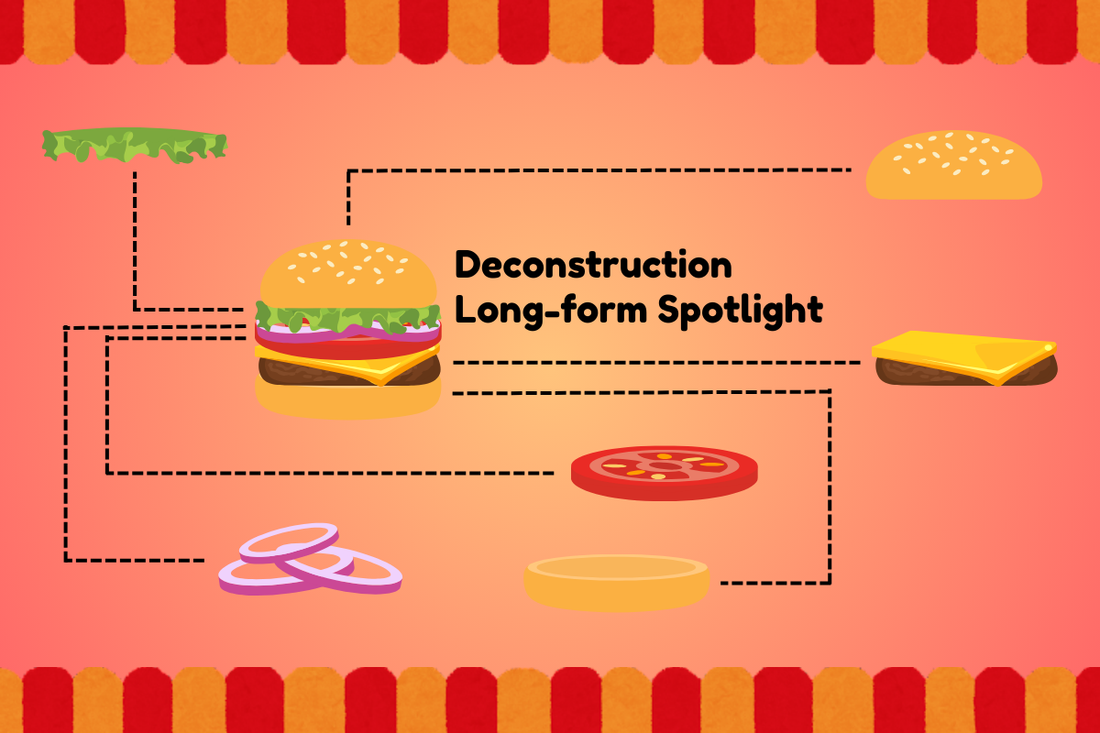Form Spotlight: "Deconstruction"

Written by Tommy Delp
Those of you who caught last Saturday’s Improv 4 graduation show may still be asking yourself, “What the hell did I just watch?”
Well, look no further as Keith Gomez, co-owner of The Focus Theater and member of Dads for Democracy gives you the lowdown on the “Deconstruction”.
A Different Approach Long Form
Everything starts with a grounded source scene that usually lasts 5 to 7 minutes and features just two improvisers.
From there, the rest of the team analyzes the source scene through a series of thematic and commentary scenes. Usually, a “Deconstruction” will consist of 2 to 4 thematic scenes followed by 4 to 7 commentary scenes. These numbers vary based on how long the team wants their set to be.
“The two big ways to investigate the source scene is through a thematic lens, understanding the bigger ideas of the source scene,” Gomez said. “And then through a commentary lens, what was weird and interesting about the source scene.”
A thematic scene may approach a similar situation with different characters, highlighting how shared ideas translate across locations and time periods. For example, kids on a playground might become soldiers in the trenches or an argumentative couple based on what is said or done during the source scene.
Commentary scenes are a bit looser, often highlighting an individual line or moment in the source scene that stood out as funny or strange.
If the title of a book or movie is said wrong, improvisers may choose to act out that jumbled piece of fiction. If another person is mentioned in passing, such as a family member or friend, that character might just show up.
“The 'Deconstruction'… forces you to be inspired in multiple ways,” Gomez said.
The “Deconstruction” has one more trick up its sleeve though. Throughout the form, there are various points where the original source scene is repeated. The first time being after the thematic scenes, and the second time being after the commentary scenes.
When the source scene is done again, improvisers may exaggerate certain parts of it to better emphasize what was covered during the thematic and commentary scenes. This repetition is central to the form, but how to do it is often debated among improv scholars.
Some teams prefer to have the same two people do the scene every time, while others prefer to have different people do it each time. Another point of contention is if it’s important to stay as close to the source scene as possible or if it’s okay to stray from it as the show goes on.
The source scene being repeated for the second time signals the beginning of the run, which is the grand finale of the “Deconstruction.”
“After you break it down those two ways, you get to have fun with the run, and make all the little jokey jokes that you’ve been stockpiling,” Gomez said.
For folks who have done a “Harold,” the run is similar to doing flurries. These bite-sized, high-energy scenes tie everything together and leave the audience wanting more as the lights go out.
Never Stop Learning
While this is the theater’s first time offering a fourth level course, the Focus hopes to continue offering it in the future.
“Hopefully,” Gomez said. “It’ll become a bit of a launching point for people to learn what they can do on their own and the many things that they can go explore.”
Structured as three mini crash courses on various long forms, the class’ students actually chose the “Deconstruction” over two other forms, the “Movie” and the “Armando.”
While each form is unique, they all require teamwork, passion, and a shared understanding of improv concepts.
“You spend three levels working on scene work, character interaction, and the mechanics of improv. Then finally with Level 4, you get to really dig into how you want to structure and put on a show,” Gomez said.
For students who are looking to stay involved, the class is endlessly repeatable. Different forms will be swapped in and out each season, and while theater management is currently taking on instructor duties, you never know who might stop by to teach a lesson or two.
If you’re interested in taking Improv 4 or any other class at The Focus Theater, check out what’s currently being offered here!
